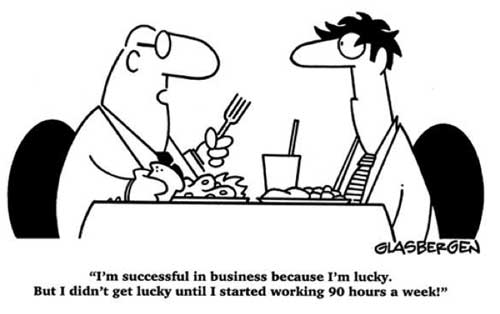Success is affected by a variety of factors. Sure, people get lucky and win the lottery while other people spend years focusing on excellence and perfecting their talents without ever catching a break… But, when it comes down to it, most of us usually need a mixture of excellence and luck to succeed.

Not surprisingly, circumstances also affect success. Last year, the pandemic left millions of workers unemployed whereas, this year, many employers can’t find workers. Was the loss of jobs simply “bad luck?” Is the inability to find workers due to a lack of excellence? It’s difficult to say when circumstances are not black and white if it was due to excellence or luck.
In contrast, many efforts like sports and skilled trades require a certain level of excellence to succeed. The application process for elite colleges provides a good example of this. Hundreds of thousands of students with excellent grades, test scores, and experiences apply to the top universities. Many of these universities admit only 3-5% of the applicants. Thus, like many efforts, there is a level of excellence required to participate, but luck can play a part in the final selection process.
So, how do we change our efforts to develop better chances of success?
When it comes to luck, there are lots of ways to improve your chances:
- TRY. As Wayne Gretzky said, “Only one thing is ever guaranteed, that is that you will definitely not achieve the goal if you don’t take the shot.” So, buying more lottery tickets or applying to more schools can improve your chances!
- Understand your environment. This can include the economy, culture, demographics, etc. You clearly have better chances of succeeding in today’s environment than during the pandemic. Women and minorities are also gaining more employment opportunities than in the past.
- Look at more alternatives. The discussion should not be retail versus E-commerce, but how to maximize both. Outsourcing and expert resources should be regular considerations. Automation and the development of inexpensive accounting, inventory, and financial tools can create significant improvements.
- Prioritize. This is a critical tool to improve what we perceive as luck. Using the 80-20 rule, eliminating ineffective programs, and focusing on winning results can all benefit effectiveness. For example, I am always amazed at the time and emotion we spend caring about sports teams that have no chance of winning.
In general, there is more potential in improving excellence and effectiveness rather than focusing on luck. Some ways to boost excellence:
- Find what you do best. Walt Disney once said, “Do what you do so well that they will want to see it again and bring their friends.” This is one of the best mantras for excellence. Do I (and does our team) have a sense of pride and passion for our efforts?
- Spend more time reviewing the processes of change versus excellence. The debate of pursuing improved excellence versus change is affected by a number of issues. We need to understand how problems affected by goals versus tactics can require different solutions. Here are some examples where organizations simply need to understand their new environment and execute better:
- Demographics: The world is simply getting older and more ethnically diverse. For example, minority births represent more than 50% of current U.S. births.
- Digital transformation: Businesses need to change rather than just execute. Opportunities like the cloud, Google, CRM systems, digital phones, apps, etc. are simply changing the processes, costs, and marketing of business. Amazon and other online retailers are revolutionizing the need for traditional brick and mortar stores. Similarly, sharing sites like Uber and Airbnb are revolutionizing their industries.
- Adapt and fully implement change. Businesses are subject to more radical change and need to build mechanisms into their processes. While we will face more uncertainty and instability, we need to focus on changing and simplifying processes to reduce the risks. Strategies like pivoting and develop/test/measure/adapt need to be built into our organizations.
- Focus on your customers. Are you satisfying their product, service, and value needs? For example, many companies have improved results by setting a goal of exceeding rather than just meeting customer needs.
- Develop a stronger pricing strategy. There are numerous tools to improve results without deteriorating your brand. Packaging efforts like bundling and unbundling, quantities, timing, quality, the Internet, and service are all elements that should be part of pricing strategies. For example, Costco and Four Seasons Hotels follow quite different, but successful value strategies.
- Set goals and measure results. Focus on judgement measures as well as quantitative. We must have greater awareness of what, how, and why we are measuring. In particular, it is sometimes easier to measure activity (visits, clicks, customers) than results (sales, conversions, and profits).
- Pay attention to how bias and prejudice affect decisions. Last year, everyone criticized the NBA for not hiring black coaches. This year, most of the hiring changes were black. The best part was that race did not seem to be a part of the process.
Excellence and luck are both important for success. They need to be understood and managed rather than viewed as excuses. Understanding the risk, the rewards, and the role experience and skill play in our decisions can improve outcomes. Don’t allow fear, uncertainty, or tradition to lower your potential and prevent you from trying something new.
Everyone’s situation is different—you may start with a little luck and need to focus on excellence or you may be at the top of your game, but just can’t catch a break. Wherever you find yourself, take a step back and look at what you’re working with—what do you need more of? Excellence or Luck? And what will you do to obtain it?
